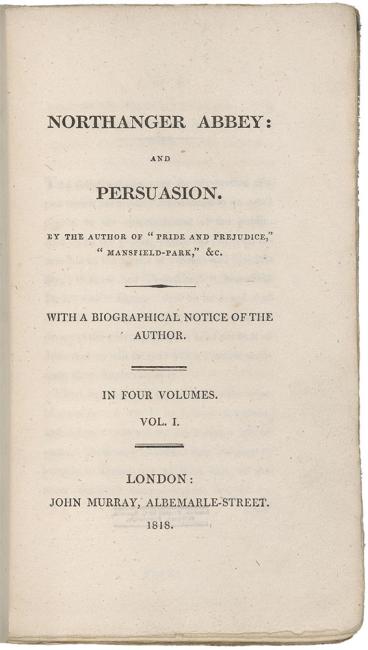Listen to co-curator Juliette Wells interpret the earliest account of Jane Austen’s life.

“ONLY A NOVEL”
Published together in a four-volume set, Northanger Abbey and Persuasion are an odd pair. Responding to the popularity of Gothic thrillers in the 1790s, when Austen first drafted it, Northanger Abbey brims with youthful energy and broad humor. In this well-known passage, the narrator proclaims the greatness of the novel as a literary genre, praising titles by Frances Burney and Maria Edgeworth.
In Persuasion, composed in Austen’s last years of life, Anne Elliot courageously turns away from her titled, self-absorbed family and toward the warmhearted, brave men and women of the British Navy. Among them are Captain Frederick Wentworth, Anne’s former fiancé, with whom she has remained in love, and his friend Captain Harville. To the latter, Anne gently but firmly asserts here that women’s accounts of their own experiences ought to be respected more than men’s declarations about women.
A prefatory, unsigned “Biographical Notice of the Author,” written by Henry Austen, identified Jane Austen by name for the first time, portraying her as a faultless Christian woman, devoid of literary ambition.
Publishing on commission, John Murray issued an estimated 1,750 copies. Cassandra, Jane’s literary executor, is believed to have earned £500 from this edition. These volumes are in the publisher’s original bindings (“boards”).
Jane Austen (1775–1817)
Northanger Abbey and Persuasion, vols. 1, 3, and 4
London: John Murray, 1818
The Morgan Library & Museum, purchased by J. P. Morgan Jr., 1928; PML 25488 and PML 25490–91
Readers outside the Austen family’s circle of acquaintance learned of Jane Austen’s identity as author first from obituaries published in Hampshire newspapers and, more widely, through the “Biographical Notice of the Author” that accompanied the joint publication of Northanger Abbey and Persuasion. This unsigned essay was written by Henry Austen, the brother who had assisted Jane with publishing.
The Jane Austen whom Henry portrays bears little resemblance to the ambitious, talented, acerbic writer we know from her novels and letters. Henry’s Jane was dull and pious. “Short and easy will be the task of the mere biographer,” he wrote. “A life of usefulness, literature, and religion, was not by any means a life of event.” According to Henry, Rev. George Austen was the primary source of Jane’s talents: “Being not only a profound scholar, but possessing a most exquisite taste in every species of literature, it is not wonderful [meaning surprising] that his daughter Jane should, at a very early age, have become sensible of the charms of style, and enthusiastic in the cultivation of her own language.” Cassandra’s vital role as Jane’s confidante and first reader is absent from Henry’s account. The myths that Henry propagated concerning Jane’s lack of interest in “fame” and “profit” were long influential, as was his portrayal of her as utterly averse to public notice.
